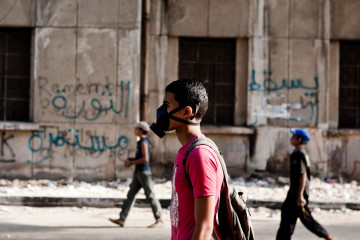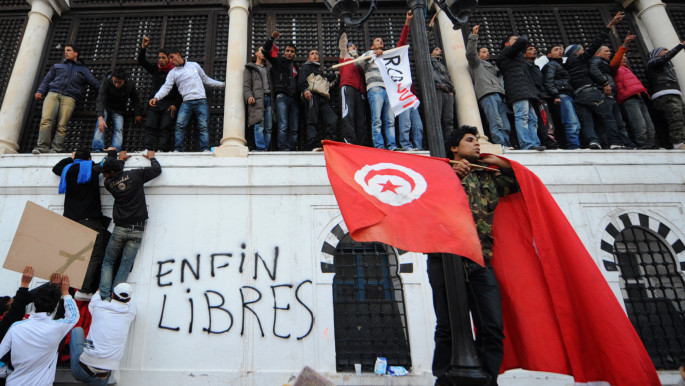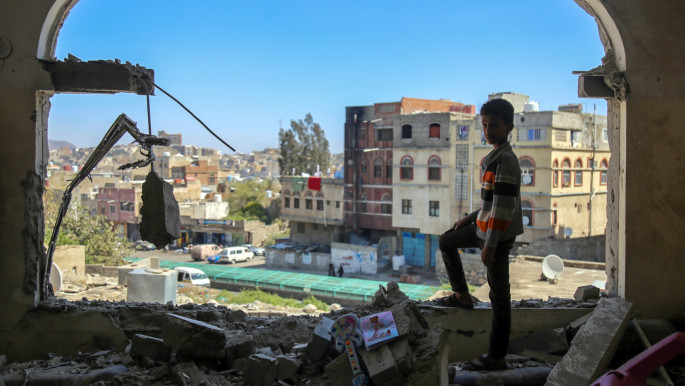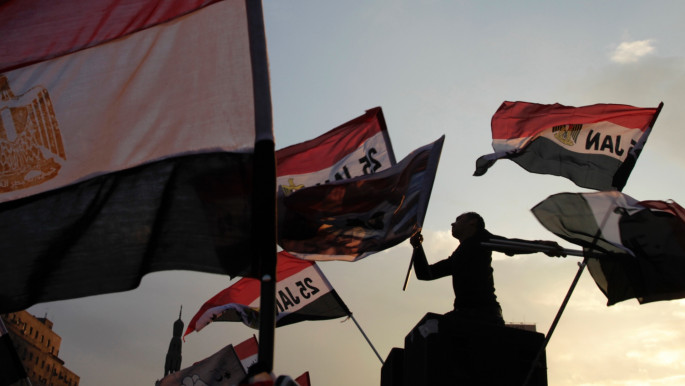

Despite claims that the Arab Spring was mostly a 'failure,' exiled activists have not given up hope. Many groups and individuals work from the diaspora to bring justice and real reforms to their homelands, raising awareness from afar while seeking the support of their host governments.
The 18th of March marked the ten-year anniversary of the arrest of Bahraini opposition leaders after calling for reforms, effectively marking the crushing of the uprising there.
Though repression and crackdowns on civil society freedoms have soared since 2011, groups like the UK-based Bahrain Institute for Rights & Democracy (BIRD) have worked tirelessly to push for freedoms within the country and gain the support of the international community.
"As Bahrain's rulers' ruthless attacks on civil society increasingly stifle campaigns for reform within the country, Bahraini activists abroad have taken up the mantle, using their proximity to Western power centres to maintain pressure on the government back home," Sayed Ahmed Alwadaei, director of BIRD, told The New Arab.
"Highly educated and attuned to the workings of international media, Bahraini exiles play a key role in amplifying the work of activists on the ground. Their remarkable success is a testament to the way in which the diaspora can assist in the struggle against authoritarianism in the Gulf."
 |
Despite claims that the Arab Spring was mostly a 'failure,' exiled activists have not given up hope |  |
On the 10-year anniversary of Bahrain's revolution, Bahraini activists contacted BIRD with reports that many children were detained for alleged protest activity. BIRD and Human Rights Watch conducted a detailed investigation into the arrests, contacting families and recording testimonies from the children.
"The investigation uncovered shocking revelations, including the fact that children as young as 13 had been beaten and threatened with rape and torture to coerce them into signing confessions," said Alwadaei.
"In response, BIRD raised their cases with British parliamentarians, who challenged the UK government to intervene on behalf of the children. Within weeks, all the children had been released from detention, demonstrating the value of cross-border collaboration in promoting positive change."
 |
|
| Read more: Tunisia's rocky path to democracy: Fighting to advance the hard-won freedoms of the revolution |
Though BIRD's case is an example of a positive initiative, there are many obstacles for exiled Arab activists. A report by the NGO Humena assessed the role of Arab activists living in the diaspora and argued that "Diaspora advocacy" is crucial for pushing for reforms. It notes that while a minority of the diaspora are involved in advocacy, most are not, which is a real limitation.
Syria has become a relevant case, as the conflict passed the ten-year mark on 15 March. Millions have fled for their lives, seeking safety from conflict and oppression in Europe, the US, Turkey, and other regional countries that would accept them.
Many have engaged in activism and political work against Bashar al-Assad's regime, particularly in Doha and Ankara, due to both governments' embrace of the opposition.
The Syrian Network for Human Rights (SNHR) has worked with UNICEF and other UN human rights bodies. It has played a significant role in raising awareness about the regime's violations against civilians and critics, and this can be reflected in recent successes such as the Netherlands and Canada calling for Assad to be held accountable for crimes against humanity.
Moreover, the Humena report acknowledged the role of other organisations like the UK-based Syria Campaign, whose videos online have been presented at the UN Security Council and at the White House.
Additionally, a notable individual case in February was that of Eyad Al-Gharib, the first Syrian government official to be convicted of crimes against humanity in a German court.
 |
The largest obstacle faced by activists in Bahrain is the rank hypocrisy of states in the West, who proclaim their commitment to human rights whilst studiously ignoring the abuses of their allies |  |
However, most Syrians do not get involved and have struggled to do so. Fadel Abdul Ghany, Director of the Syrian Network for Human Rights (SNHR), told The New Arab that as millions fled the civil war, many left behind their belongings and homes, and left Syria in a poverty-stricken state.
"This means that Syrians' main focus in a host country is often survival before anything else," he added.
Such a reality could also apply to Yemenis, who have fled a country known for the world's worst humanitarian crisis since its unsuccessful revolution and subsequent war. While the country has been under a Saudi-led blockade on air and seaports since 2017, some managed to escape before, settling in countries like Turkey, Egypt, and GCC states - where the possibilities for activism would be limited - and sometimes in Western countries.
Moreover, once many activists do reach a new country, there are still political and legal limitations. For example, the Humena study showed that over 90 percent of activists "do not have sufficient knowledge and skills to lobby with officials, governments, policymakers and international actors."
"Although many of the diaspora activists are direct victims to atrocities and rights violations in home countries, they aren't able to contribute to justice efforts, as their knowledge about international justice mechanisms is limited, including their knowledge on individual contributions like submitting complaints to UN relevant bodies," the study added.
Facing further challenges are activists campaigning against governments with friendly relations to Western countries, like Egypt and Saudi Arabia, who have put pressure on exiled critics.
 |
|
| Read more: How the odds were stacked against Yemen's Arab Spring revolution |
Sherif Mansour, Middle East and North Africa programme coordinator at the Committee to Protect Journalists, has long raised awareness about Egypt's domestic violations. Yet due to his criticisms, his family members in Egypt have been targeted, with security forces raiding three of his relatives' homes since August.
Mansour told The New Arab that the relatives of prominent regime critics living in exile are often targeted within Egypt, as a means of pressuring and intimidating them.
He fell out of favour with the military, which has acted as a shadow government in Egypt for decades, before, during and after the 2011 revolution.
"Before the 2011 uprising, I was exiled for 6 years in Washington. My work had involved training young liberal leaders and activists in Egypt and bringing them to the United States for an exchange program."
Due to empowering liberal thinkers within Egypt, and his criticism of the military, in 2012 he was requested for extradition and received an Interpol red notice. The armed forces were calling the shots at that time, despite the presidential elections which saw Mohammad Morsi lead the country, until the 2013 counter-revolution toppled him.
Some activists have continued to work from abroad, raising awareness about the abuses of general Abdel-Fattah al-Sisi's government since the crushing of the revolution. The NGO Civicus along with Humena in 2019 launched the "Unmask them campaign" to expose ministers, foreign governments and businesses who worked with the Sisi government and aided its repression of civil society.
However, prominent individuals like Mansour are often monitored. Mansour told The New Arab that his own messages have been hacked by Egyptian intelligence groups working abroad, and that other exiled regime critics have also faced similar dangers.
 |
We are now back to square one. People are still pushing for change, and I believe the desire for change has not been extinguished |  |
Though there have been some successes due to human rights activism, particularly as the EU parliament and some policy makers in Western governments have called for pressure on Sisi's regime, there is still much work to be done.
"The Arab Spring was a real opportunity to build a connection with people in the southern Mediterranean, but it was a missed one," said Mansour. "We are now back to square one. People are still pushing for change, and I believe the desire for change has not been extinguished."
Even though many Arab activists are in exile, Mansour said that Jamal Khashoggi's role was highly inspirational, as he was a significant supporter of the Arab Spring's eventual success, until his killing in the Saudi consulate in Istanbul in 2018.
 |
|
| 'We lost to a violent system': A family portrait of Egypt's revolutionary struggle |
"Khashoggi took a great risk, before his assassination. It shows that despite the challenges and setbacks, people really still believe in change."
As Mansour suggests, those fighting for justice in their home countries would need the international community on board. Particularly as Western governments continue to support the Sisi regime in Egypt. Until then, lax pressure from the international community will hinder reform efforts.
Alwadaei recognises the same issue for Bahrain.
"The largest obstacle faced by activists in Bahrain is the rank hypocrisy of states in the West, who proclaim their commitment to human rights whilst studiously ignoring the abuses of their allies," he said. "While Western states were quick to salute the protesters in Egypt and Tunisia, they remained conspicuously silent when Saudi troops rolled into Bahrain to crush the fledgling uprising."
"If we want to see genuine change in Bahrain, Bahrain's Western allies need to cease spouting platitudes and hold the regime to account for abuses. Until human rights are valued above arms sales and trade deals, Bahrain's government will see no reason to reform."
Follow him on Twitter: @jfentonharvey




 Follow the Middle East's top stories in English at The New Arab on Google News
Follow the Middle East's top stories in English at The New Arab on Google News


